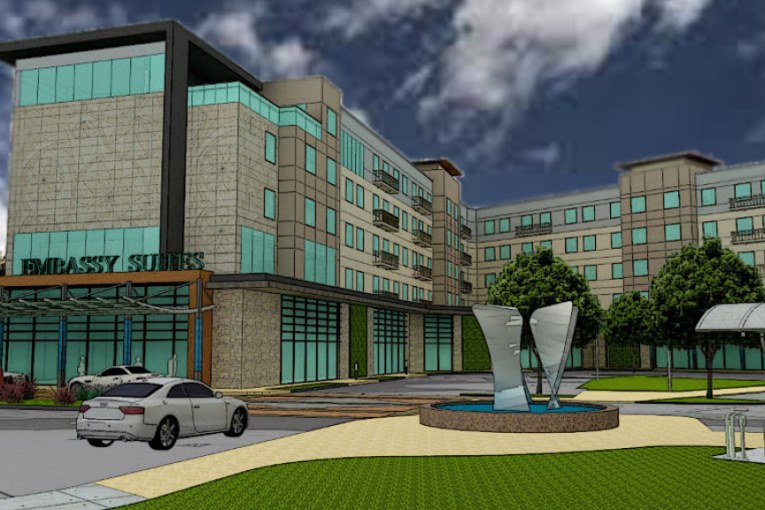

It has been just over a month since a settlement agreement was announced between Royal Ganesh, LLC, and Michael Harrington, and in that time there has been a great deal of speculation about the future of the hotel.
Last week, Royal Ganesh filed an amended application that scales down the hotel and in particular the conference center.
In the project description, the applicants describe their project as “a Prototype Embassy Suites, five-story hotel with meeting space on 2.82 acres located at the southwest corner of the intersection of Richards Boulevard and the westbound Interstate 80 on-ramp in the City of Davis located in Yolo County.”
The project will replace the existing single-story 43-room University Park Inn and Suites and Caffé Italia restaurant with a new five-story 132-room hotel. It includes 5,662 sf of restaurant/lounge and 4,443 sf of functional space (comprised of 3,150 sf of meeting rooms and 1,293 sf of pre-function area).
“All existing structures will be demolished and the site will be cleared for the proposed new expanded use,” the description continues.
This is a far cry from the hotel conference center originally proposed which would have included 18,400 square feet of conference space.
With the scaled-down conference center, the project now calls for surface parking with about 70 spaces along the south side of the facility and an additional 60 surface spaces located on the west side of the building, for a total of about 130 parking spaces.
The description adds, “A variety of site improvements are proposed, including parking enhancements, pedestrian and vehicular circulation modifications, new landscaping, and utility upgrades.”
They add, “Subsequent project phases, if and when pursued, will be subject to separate applications, as appropriate, and environmental review.”
On October 20, 2015, Mr. Harrington and Mr. Mooney filed a lawsuit against the project applicant and the city. They alleged the “IS/MND” (Initial Study/Mitigated Negative Declaration) for the project was approved in violation of CEQA because of unmitigated traffic impacts to the Richards Boulevard and Olive Drive intersection.

The council had unanimously approved the project in August 2015 despite objections from a variety of different sources.
Former City Councilmember Michael Harrington raised the issue of planning process, stating, “I think we have a situation here where the city staff is recommending the use of a ‘neg dec’ to avoid a full CEQA analysis and I think that the facts and law are against that process.”
He added, “I think that the weaknesses in the traffic report and the fact that the historic resources were not really evaluated, I think that that places you out of the ‘neg dec’ status and I believe that if you continue this and look at it some more, you’d have a good project.”
Alan Pryor, continuing on his line from his guest column in the Vanguard, stated, “I think there are many problems with this project that we really have to work through.”
He said, “For one, the traffic analysis was deficient in that it relied on unjustifiably low pre-existing baseline traffic counts taken by humans only over a two-hour period last year. I certainly don’t think you can say that’s representative.”
He further stated that this is compounded by under-counting or underestimating the number of vehicles that would come to the facility during maximum occupancy events. He argued that they did not have near enough parking to handle that.
In the settlement agreement, it states, “Royal Ganesh shall submit an application to the City of Davis to amend the Project” to include “3,130 square feet of solar panels to generate power for its premises, in a location that is suitable for maximum efficiency.”
The hotel will also be reduced by one floor, although the height of the building will remain at 74 feet, six inches.
The hotel also agrees to “valet parking to an on-site lot, and as necessary, to an off-site lot located in the immediate area of the Project, south of the Richards Undercrossing,” no less than 15 loaner bikes, shuttle service to and from the airport, and charges for overnight parking to discourage guests from arriving by vehicle, among other changes.
In exchange, “Petitioner and its members shall not challenge the project design changes discussed in paragraph 5 during any required administrative review by the City or by way of subsequent litigation.”
However, “[N]o buildings or structures relating to the Project, as approved or modified, shall create an impediment to the City’s proposed right-of-way modifications to Richards Boulevard…”
There was also a modest settlement fee of $75,000 paid to the Law Offices of Donald Mooney.
In the applicants’ narrative they write, “The need for a full service hotel combined with flexible meeting space, and located proximate to downtown and the University, has been identified for years in Davis. Such a facility is a clearly stated goal of the City of Davis Community Development Department and is listed on the City Council’s goals for 2012-2014.”
The applicants continue, “UC Davis’ many departments, administrators, and professional schools conduct hundreds of group meetings, programs, retreats, and conferences each year.” Due to the lack of suitably located available space in Davis, of necessity, many of these events convene in Sacramento. Moving some of these events to Davis will enhance physical connectivity to the campus, increase sales and transient occupancy tax (TOT) revenues for the city, and reduce lengthy commuter travel, thereby bettering regional traffic and air quality.
The applicants estimate annual TOT at approximately $450,000 plus property taxes and sales taxes generated by hotel users eating and shopping in Davis.
—David M. Greenwald reporting

For more details CLICK HERE
Or fill out the form below to become a monthly subscriber
